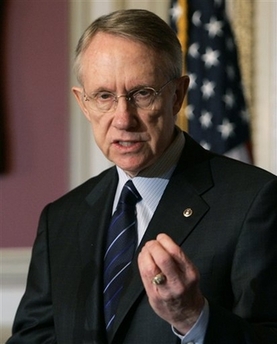Reid warns against rush on gun control
(AP)Updated: 2007-04-18 07:48
WASHINGTON - After the worst mass shooting in US history, Senate Majority Leader Harry Reid cautioned Tuesday against a "rush to judgment" on stricter gun control. A leading House supporter of restrictions on firearms conceded passage of legislation would be difficult.
 Senate Majority Leader Harry Reid of Nev. gestures during a news conference on Capitol Hill in Washington, Monday, April 16, 2007. [AP]  |
"I think we ought to be thinking about the families and the victims and not speculate about future legislative battles that might lie ahead," said Reid, a view expressed by other Democratic leaders the day after the shootings that left 33 dead on the campus of Virginia Tech.
Democrats traditionally have been in the forefront of efforts to pass gun control legislation, but there is a widespread perception among political strategists that the issue has been a loser in recent campaigns. It was notably absent from the agenda Reid and House Speaker Nancy Pelosi unveiled earlier this year when the party took control of the House and Senate for the first time in more than a decade.
In the wake of the Virginia Tech shootings, a few Democrats renewed the call for gun control legislation, and more are expected to join them.
"I believe this will reignite the dormant effort to pass commonsense gun regulations in this nation," said Sen. Dianne Feinstein, a California Democrat who was a leader in the failed drive to renew a ban on certain types of assault weapons that expired in 2004.
Sen. Edward M. Kennedy, D-Mass., was one of very few lawmakers to defer pushing for gun control in the early hours after the shootings. "There will be time to debate the steps needed to avert such tragedies," he said on Monday, "but today, our thoughts and prayers go to their families."
By coincidence, Kennedy and Rep. Xavier Becerra, D-Calif., are scheduled to attend a demonstration Friday at a firing range used by US Capitol Police to draw attention to microstamping, a procedure by which serial numbers are placed on ammunition casings. The goal is to allow police and other investigators to quickly track ammunition to the gun that fired it.
The two lawmakers support legislation to require microstamping for all guns manufactured after 2009, and aides to both said they planned to go ahead with the demonstration.
Overall, though, said Rep. Carolyn McCarthy, D-N.Y., "It is a tough sell" to pass gun control legislation. Speaker Nancy Pelosi, D-Calif., held a brief meeting on the subject to discuss possible legislation, but there was no apparent eagerness by Reid, House Majority Leader Steny Hoyer, D-Md., or her to predict Democrats would lead a drive to toughen existing laws.
One senior Democrat, Rep. Charles Rangel of New York, said gun rights advocates are simply too influential to allow a tightening of gun control laws. "It's a regional thing, it's a cultural thing," Rangel said, arguing that even in areas where 85 percent of the people support more restrictions, the 15 percent minority is far more active and outspoken.
Less than a month ago, Pelosi and other Democratic leaders abruptly pulled legislation to give the District of Columbia voting representation in the House. Republicans were using the issue to try to force a vote on repeal of the capital's handgun ban, and Democrats feared it would pass.
Hoyer told reporters he thought and hoped the shootings at Virginia Tech would make it harder for Republicans to prevail when the voting rights bill returns to the House floor later this week.
He refused to be drawn into a discussion of the longer-term political consequences of the shooting, saying, "All I am saying is there will be a debate. I am not going to enter into the debate today."
Not all lawmakers were as reticent.
Sen. Larry Craig, R-Idaho, one of Congress' most persistent advocates of gun rights, noted that the student who police say was the shooter at Virginia Tech had brought a weapon onto campus in violation of restrictions. He said he doubted a law could be passed that would protect "any of us when somebody who is mentally deranged decides to do this."
President Bush said in an interview with ABC News said he expects a debate on gun policy, but now is not the time.
"I think when a guy walks in and shoots 32 people it's going to cause there to be a lot of policy debate," he said. "Now is not the time to do the debate until we're actually certain about what happened. And after we help people get over their grieving. But yeah I think there's going to be a lot of discussion."
One law enforcement official has said that the gunman's backpack contained a receipt for a March purchase of a Glock 9 mm pistol. The gunman held a green card, meaning he was a legal, permanent resident, federal officials said. That meant he was eligible to buy a handgun unless he had been convicted of a felony.
Democrats have grown less supportive of gun control legislation as a party in the past decade.
After the shootings at Columbine High School in Colorado, then-Vice President Al Gore cast a tie-breaking vote in the Senate on legislation to reduce the availability of certain firearms. He and other gun control advocates claimed victory, but many strategists believe the vote hurt him in the 2000 presidential election.
Gun control tends to win favor among suburban voters, but it often stirs opposition in less heavily populated areas
So far this year, there has been little evidence that Democrats feel otherwise after winning control of the House by picking up seats last fall in parts of Indiana, Ohio, Texas, Arizona and elsewhere where hunting is popular.
|
||
|
||
|
|